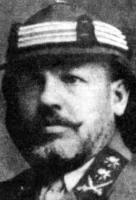Ali Rida ar-Rikabi
Ali Rida ar-Rikabi , also Rida Pascha ( Arabic علي رضا الركابي, * 1868 in Damascus ; † 1943 in Damascus, Syrian Republic at the age of 75), was a politician and general. He was Prime Minister of the Hashemite kingdoms of Syria and Jordan .
Life
Ar-Rikabi was trained as an officer in the Ottoman Army at the Ottoman Military School in Istanbul . In 1901 he reached the rank of general. He also received the honorary title of pasha . He also served as military governor in Jerusalem . From 1908 he served as military governor and administrator of Medina . At the outbreak of the First World War , Ar-Rikabi served as the commander of the armed forces in Baghdad. However, he was dismissed due to defeatist statements. He commanded a brigade during the World War. Ar-Rikabi joined the Arab Revolt under Emir Faisal towards the end of the World Waron. He commanded the troops of Faisal in the surrender of Damascus from the remnants of the Ottoman army.
When Faisal became king in Syria after the end of the war, he made Rikabi prime minister and military governor. Rikabi's policy was determined by the chaos that existed in Syria after the fall of the Ottoman Empire. The kingdom came under increasing pressure from France , which wanted to convert Syria into a mandate dominated by it. After an ultimatum to dissolve the kingdom and the occupation of Latakia by French troops, Rikabi resigned in July 1920 due to the military hopelessness of the confrontation with France. The French mandate authorities sentenced Ar-Rikabi to death and he fled to Jordan, which was ruled by Abdallah ibn Husain I. Ar-Rikabi was Prime Minister of Jordan from 1922 to 1924 under King Abdullah I. The Lebanese historian Kamal Salibi ascribes the role of a collaborator with the colonial powers to him, who was made prime minister mainly because of his personal animosity against Abdullah. During his rule, the army had been purged of anti-colonial officers. In 1924 Ar-Rikabi returned to Syria and founded a monarchist party there, which demanded the return of Faisal. After Faisal's death, he retired from politics in 1933.
Individual evidence
- ↑ a b c Sami Moubayed: Steel an Silk Men and Women Who Shaped Syria 1900-2000 , Seattle, 2006, pp. 319–321
- ↑ Lt. Com. Youssef Aboul-Eine, USN: History of the Syrian Arab Army , Infantry, Nov-Dec 2005, pp. 20-25
- ↑ Kamal Salibi: The Modern History of Jordan , 2nd Edition, London, 1998, pp. 112-113
| personal data | |
|---|---|
| SURNAME | Rikabi, Ali Rida ar- |
| ALTERNATIVE NAMES | Rikabi, Rida; al-Rikabi, Rida Pasha |
| BRIEF DESCRIPTION | Jordanian and Syrian politicians |
| DATE OF BIRTH | 1868 |
| PLACE OF BIRTH | Damascus , Vilayet Syria , Ottoman Empire |
| DATE OF DEATH | 1943 |
| Place of death | Damascus, Syrian Republic , League of Nations mandate for Syria and Lebanon |

